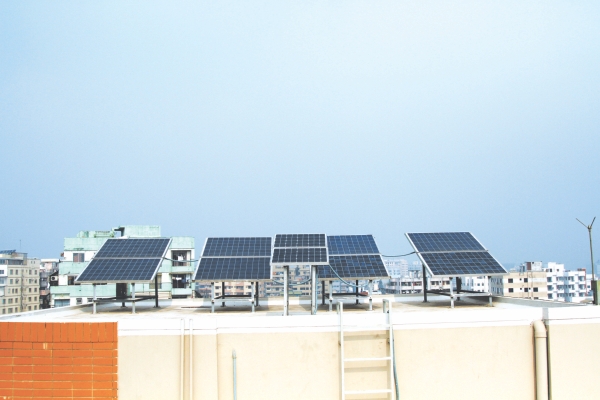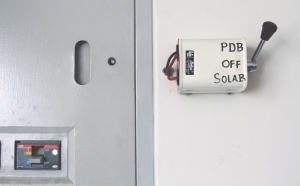| Home - Back Issues - The Team - Contact Us |
 |
| Volume 11 |Issue 24| June 15, 2012 | |
|
|
Environment
A Brighter Future? With the 2015 finish line for the Millennium Development Goals in sight, the UN has begun championing what it hopes is next on the development agenda – sustainable energy for all Soraya Auer Give a man a fish and you feed him for a day; teach a man to fish and you feed him for a lifetime. This analogy has often been described as the difference between charity and development work. It is also an interesting way of distinguishing between development and its future buzz phrase, 'sustainable development'. So what is the difference, I hear you ask? Sustainable development is about making sure that people throughout the world can satisfy their basic needs now, while making sure that future generations can also look forward to the same quality of life. It recognises that there are three interconnected 'pillars' – the economy, society and the environment. The concept, which is logical and holistic, has been around for decades and is somewhat incorporated in the Millennium Development Goals (MDGs), which expire in 2015. “Saving our planet, lifting people out of poverty, advancing economic growth – these are one and the same fight,” said United Nations Secretary-General Ban Ki-moon in September last year. To tackle this same fight, the UN has acknowledged that sustainable development is not possible without sustainable energy and has since launched a new initiative called 'Sustainable Energy for All'. The objectives to ensure universal access to modern energy, double the rate of improvement in energy efficiency and double the share of renewable energy in the global energy mix – all by 2030 – come at a critical point for Bangladesh, which has suffered an energy crisis in recent years. According to Dr Atiq Rahman, Executive Director of Bangladesh Centre for Advanced Studies (BCAS), more than 37 percent of Bangladeshis are still without a simple electrical light. Bangladesh also uses gas to meet 70 percent of its energy needs – an unsustainable fuel source in the future.
In less than a week, Rio+20, the UN Conference on Sustainable Development will welcome leaders from across the world for the second time in two decades, to agree on an effective transition to a green economy, how to make significant investment in renewable energy, to discuss the efficient use of natural resources and share research and innovative technologies. In the lead up to the summit, there has been a lot of discussion as to what Bangladesh can hope to get out of attending Rio+20 and what the country will do post-2015 in terms of development goals. “What about having Bangladesh development goals? Where is ownership for the MDGs? To what extent are the MDGs subject to budgetary and parliamentary scrutiny and oversight?” asks MP Saber Hossain Chowdhury, Chairman of the parliamentary group on climate and environment, at a UNDP hosted roundtable. He suggests Bangladesh needs to have goals of its own with some relationship to global aspirations but that are measurable and achievable for the developing country. “In the past we have had a country approach with regards to international challenges and it has simply not worked,” explains Chowdhury. “In the past we may have existed as 192 small boats and the priority then was to make sure these boats did not collide and if they did, they wouldn't sink. Now the challenge of international governance is that we are on one big ship with 192 cabins – you're looking at one captain and one steward who are going to navigate this boat.” The MP adds, “We shouldn't just assume we have an answer to sustainability because once we accept that reality, we can manage expectations. We expected a lot from [the UN summits], a lot from Copenhagen [Climate Summit] – we were disappointed. I think in Rio, we should not expect too much because it is not going to revolutionise the way we do international governance or international processes.” Chairman of the Palli Karma-Sahayak Foundation (PKSF), Qazi Kholiquzzaman Ahmad, who is expected to lead Bangladesh's delegation at the summit, is also somewhat disappointed by other countries' broken pledges. “Of the £30 billion committed by the wealthy nations for climate vulnerable countries, just over $3.5 billion was actually released in two years. At Rio, we must not miss the opportunity to demand what we need.” Dr Hasan Mahmud, the Minister of Environment and Forests, believes Bangladesh is on the right path to achieving the MDGs. “Bangladesh sets an example to the rest of the developing world. It has been playing a vital role in the climate change negotiation and it is currently the chair of the Most Vulnerable Countries group. “We are trying to play the same role in the Rio+20, in the future development framework and in achieving SDGs [Sustainable Development Goals]. We have engaged leading economists and people who have been working in this field of environment for a long time and after long consultation we have made a country position paper of 32 points – we are one of the first countries that has presented its country position paper [to Rio+20] on time.” The Minister expresses more optimism than Chowdhury and Ahmad, by saying he expects a renewed commitment by different governments. “I strongly believe we will need a green economy to achieve SDGs. To achieve sustainable development we need development and industrialisation but we do not need to pollute our environment anymore. We should protect our environment and the private sector has a very vital role to help protect the environment. So I don't agree with the people who say we need to rely on the private sector – it has to be a composition of both private and public and the steering wheel should be in the hand of the public sector to achieve these goals,” says Dr Mahmud. The truth is the private sector has taken the lead in implementing sustainable energy methods until now. Grameen's Shakti Programme (Green Energy) and Rahimafrooz's Renewable Energy division has made solar home systems available and affordable to rural populations while social business enterprises such as, Waste Concern, have been turning a waste crisis into a green business by collecting and recycling waste. Rio+20 is certainly Bangladesh's government's opportunity to demonstrate its commitment to turning the country green but as everyone can agree, there is a lot more talk than there is action at this point. Unfortunately for those who desperately need access to a light in their homes now, it may be some years before Bangladesh's public sector actually takes that steering wheel.
Copyright
(R) thedailystar.net 2012 |

